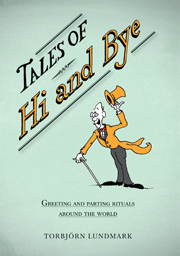Book contents
- Frontmatter
- Contents
- Acknowledgements
- To the reader
- Introduction
- Gestures & Signals
- Customs & Behaviours
- Names & Addresses
- What's so good about it? the curious nature of ‘good-’ greetings
- Ahoy, ahoy! Pick up the phone! ‘hello’ and its uses
- The unlucky Mr Szczęściarz: foreign names in foreign places
- Wang is King in China: too many people, not enough names
- Finding Björk: Icelandic names
- Yoo-hoo! Who? You! how Swedes don't address each other
- Mister Doctor: titles of medicos, surgeons and barbers
- I forget my name: loss of first name by marriage
- When your coz is your sis: kinship terms
- You, thou and other politenesses: familiar and polite ‘you’
- Include me out! dual, trial and other grammatical curiosities
- For me to know and you to find out: naming and name taboos
- Bye-bye! how things have changed
- Postscript
- Notes
- Sources
- Index
You, thou and other politenesses: familiar and polite ‘you’
from Names & Addresses
Published online by Cambridge University Press: 04 February 2010
- Frontmatter
- Contents
- Acknowledgements
- To the reader
- Introduction
- Gestures & Signals
- Customs & Behaviours
- Names & Addresses
- What's so good about it? the curious nature of ‘good-’ greetings
- Ahoy, ahoy! Pick up the phone! ‘hello’ and its uses
- The unlucky Mr Szczęściarz: foreign names in foreign places
- Wang is King in China: too many people, not enough names
- Finding Björk: Icelandic names
- Yoo-hoo! Who? You! how Swedes don't address each other
- Mister Doctor: titles of medicos, surgeons and barbers
- I forget my name: loss of first name by marriage
- When your coz is your sis: kinship terms
- You, thou and other politenesses: familiar and polite ‘you’
- Include me out! dual, trial and other grammatical curiosities
- For me to know and you to find out: naming and name taboos
- Bye-bye! how things have changed
- Postscript
- Notes
- Sources
- Index
Summary
Many languages have ways of referring to another person in a respectful way. The English way of using ‘Sir’ and ‘Madam’ is a good example.
One thing that modern English lacks is the twotiered system of the word ‘you’, as used in countless other languages, for example tu/vous in French, ty/vy in Russian, du/Sie in German, tu/Lei (or tu/voi) in Italian, du/ni in Swedish, tú/usted in Spanish, ni/nin in Chinese, and so on. (Linguists use the French as their model and call the two the ‘T-form’ and the ‘V-form’, regardless of language.)
But until a few hundred years ago, English too made this distinction, in separating ‘thou’ (the casual and familiar form) from ‘you’ (the polite and respectful form). The use could not be described as obsolete from Standard English until about 1800, and can still be heard today in certain dialects, such as in Newfoundland, Canada. The familiar/polite distinction can be found in Shakespeare's plays, for instance, where friends call each other ‘thou’, while reserving ‘you’ for superiors:
Thou poisonous slave … come forth!
(The Tempest, Act 1, Scene 2)
But:
I told you, sir…
(The Tempest, Act 4, Scene 1)
It wasn't always so, and usages have glided in and out of fashion over the centuries. To begin with, ‘thou/thee’ was simply the singular form, while ‘you’ was the plural. By the 1500s, ‘you’ had taken over as the pronoun used for both singular and plural (as it is today), and ‘thou/thee’ was only used in certain situations.
- Type
- Chapter
- Information
- Tales of Hi and ByeGreeting and Parting Rituals Around the World, pp. 187 - 193Publisher: Cambridge University PressPrint publication year: 2009

